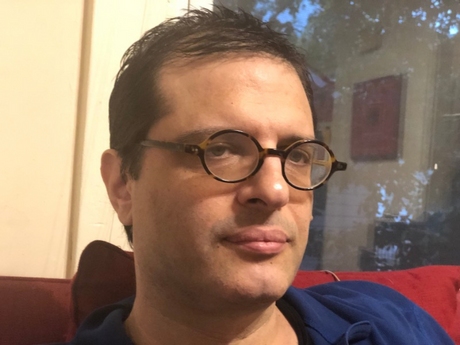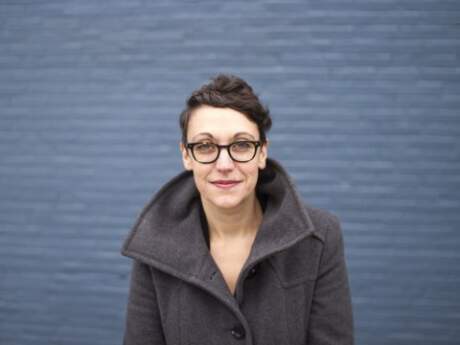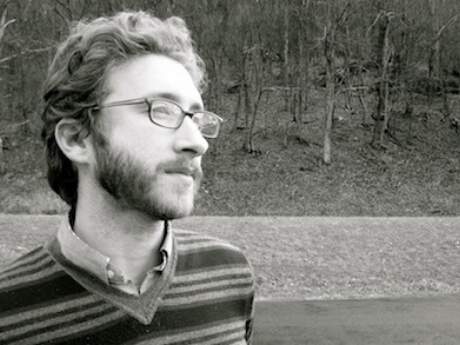New American Poets
New American Poets: Stuart Greenhouse

Means of Production,
And Behind The Stove Is My Heart
and why not as easy as if these words
were tea leaves curled in a tea box, and time
were all it took, and some fire, and a kettle
for form, to give the water heat
but not the heat water, just a little
form, an old Pyrex one, say, the one
your grandfather threw out
his bubbe's copper samovar for, and then
a porcelain knockoff beauty, round and high, a little
more form, just enough
to hold a scalding and then
dry leaves as your readied sea of boil
drowns them young again, floating open, easy
as you once were, thinking words were
Reprinted with the permission of the author.
When did you set your foot on the path of poetry? Did you feel a sudden bolt? Or did you grow gradually more passionate about poetry?
I'd always wanted to be a writer, though the first time the mature desire manifested was summer vacation, when I was 16. I'd idly picked up Dostoyevsky's Crime and Punishment, and then spent the afternoon, then night, reading it, finishing it around 4 in the morning and dazedly amazed turning for no particular reason back to the title page, just sort of looking at it. I was staring at the copyright page for a minute before realizing I was looking at a number—1873—and that the number meant that before that year, this book didn't exist, that a person had written their way through it and that was how it came to be. It was such an amazing concept—that books were made by people in tremendous uncertainty from word to word, that there was no right way to do it until it was done and you saw that it was right, or what was right about it—that I wanted to do it. But first I felt I had to read everything. Which was pretty silly. Years later, I finally got around to taking a fiction workshop in college with Alan Michael Parker, who really was a wonderful professor. The next semester he was only teaching a poetry class, so even though I wanted to write sprawling novels of Joycean density, I more tangibly wanted to take another workshop with Parker; so took it. My poetry was not well-received by my peers to say the least, and my self-image was so wounded I spent the better part of a decade working on writing better poetry. And here I am.
Are there aspects of painting or photography or dance or video art or music or architecture or theater or film or any other art inform your own poems or that your poems are in conversation with? If so, how?
Absolutely. I write so much in dialogue with not only other writers but with other works of art, painting mostly. I've been working on a group of poems in which I approach paintings deliberately ignorant of anything except for what my eye sees/imagines there, even (especially) if what I perceive/remember perceiving is erroneous. In these poems I'm interested in the filter by which I see, and how such a filter can result still in a true and honest seeing, and not so much in what I'm supposed to see. It's very liberating.
Did you start off with an idea that your book grew around? Did you move away from that idea as the book progressed?
Not really, I just wrote things and learned, afterwards, from them what ideas I might have worth having.
Are you interested in the relationship between poetry and politics? Do you believe that your own poetry has political implications?
Yes, but only insofar as it is a political act to simply observe the body politic and the environment (both psychic and physical) it creates for what it is and not for what it wants you to think/say it is.
Do you think that your poetry or poetry in general speaks to spiritual or religious yearnings and struggles? If so, how?
Absolutely, or at least I hope and intend for it to do so. I think we as a habit live mostly inside illusions we project outward, and that seeing through them (as opposed to with them) is simple as not making them, or at least focusing in a way which de-emphasizes them. But how do you do that? It's different almost each second. I'd like my poems, ideally and at their best, to connect with another consciousness and help them slow down their thought enough to see it being constructed, and thus understand that it is constructed, and that they have power over that process, and don't have to use it only to hide inside.
There are a few strategies by which a poem can undertake to do this. I probably won't be able to exhaustively list them all here, but here's what comes immediately to mind. One, simply to point out the universe unadorned and unobstructed. I'm frankly not very good at that sort of poetry, though I try. Another is to represent someone struggling (that would be 'me,' the speaker of the poem) and then turn that piece of origami, so to speak, inside out, so that the reader is implicated too and feels themselves sort of stop for a second while the world keeps going. Another is to notice some perception-structure which is more or less common in society, and act that out in a poem, and then show a way through it to the other side, to reality. Shakespeare, for example, is really good at that; I'm no Shakespeare, but I try to make it work in my own little way. Another is to, to quote Stevens, "resist the intelligence almost successfully," which to me right now means to really make someone work at taking apart an unfamiliar construction/syntax of perceptions, desires, and expectations; if the reader works (enjoyable work, like a puzzle, one hopes) at such a level of consciousness, then when they are done with the poem and return to their normal way of thinking/ perceiving/ living, the habit of paying attention to the insides of their eyes, so to speak, persists, and they see themselves constructing themselves with their own peculiar syntax of repetitions and variations, like a poem. And maybe they'll laugh, and feel more themselves and in the world, if I did ok by them.
So how is this spiritual/religious? That would involve the ethical dimension of living a life in which you perceive others as they are, not as you fear/desire them to be. Which is pretty much heaven, whenever you can accomplish it, for however long.


